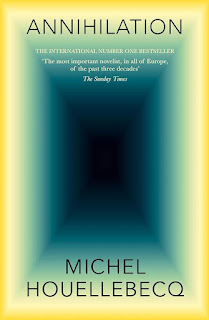Rating: Admirable
Martin Amis is not known for his short stories, with only two collections published in his lifetime, Einstein's Monsters and Heavy Water and Other Stories (1998), among some later omnibus publications of collected stories which included the two volumes and some other strays. Einstein’s Monsters was apparently put together when Amis realised that the short stories he had been writing were centred around the theme of nuclear weapons. Einstein's Monsters begins with an essay called Thinkability, in which Amis outlines the true horror of the threat of nuclear weapons and the annihilation they could potentially unleash. It makes for harrowing reading and despite being written and published during the height of the Cold War, the essay is still chillingly relevant. Amis bemoans the terrible irony of the need for nuclear weapons because of the existence of those very same nuclear weapons. After this short essay the first story, Bujak and the Strong force, Or God’s Dice, provides a very decent beginning, with a Polish protagonist whose strength is such that it metaphorically mirrors the strong nuclear force. It brings him a great deal of trouble, of course, and things don’t go well for his loved ones because of it. It’s a fine, if flawed tale. Insight at Flame Lake uses contrasting diary entries to tell the story of the impact of a schizophrenic boy on his host family. The boy’s father had worked with nuclear weapons before committing suicide. Ultimately it’s a rather heavy-handed allegory for the travails of having nuclear weapons around.
 |
| Martin Amis, contemplating Einstein's Monsters |
The Time Disease is entertaining but doesn’t quite suit being shoehorned into a collection of nuclear themed stories. It’s futuristic in nature, featuring people who are terrified of time and its deleterious effects on aging, in this case they are aging in reverse. As with all of these stories it features enough of that trademark Amis erudite flair and biting wit to make it worth reading. The actual writing is quite brilliant, but the overall effect is diminished by the shape of the plot. The Little Puppy That Could continues in this fashion. Set in a post nuclear apocalyptic future, things are so bad that a huge, deformed malevolent dog is menacing the ill and deformed residents of a dilapidated village. Their ploy is to offer up weekly sacrifices. Meanwhile a little puppy (who doesn’t appear to be normal himself) with great persistence worms his way into the heart of a little girl. Most of the villagers are scared of the poor little puppy, due to the giant deformed canine that menaces them on a weekly basis. It’s a bit long and grotesque, but does create a nice amount of tension, particularly in the last third of the story. The story has classical mythological allusions within its twisted narrative, but it doesn’t provoke enough motivation to do the research to understand them, at least in my case. The final story, The Immortals, is one of the finer to be found within this slender collection. It recounts the life of an immortal as he traverses the gulfs of time that encompass the history of the planet. There are some great lines, included references to decades long recreational habits and how various epochs compared in terms of boredom and danger. Turns out that ultimately the future involves the imposition of nuclear warfare and the last of humanity in New Zealand who dream that they are indeed immortal. It’s clever all right, but other than its often-brilliant prose it doesn't work quite as well as you want it to. Based on Einstein’s Monster’s, Amis wasn’t really a natural short story writer and it is probably not a coincidence that he didn’t produce many throughout his otherwise brilliant career. This collection is vaguely disappointing, but even acknowledged geniuses have lapses and in the scheme of things these stories are still worth reading just to bask in the glory of Amis’s brilliant prose style.




























